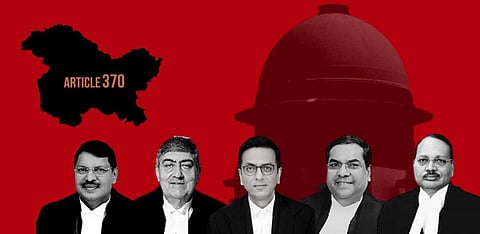

The Supreme Court will commence hearings from August 2 on pleas under which the Union government's decision of reading down Article 370 and changing the special status of Jammu and Kashmir has been challenged.
—
AFTER being kept in cold storage for three years, hearings on a batch of petitions challenging the Union government's decision to revoke the special status of Jammu and Kashmir (J&K) and divide it into two Union territories will commence on August 2.
A five-judge Constitution Bench headed by Chief Justice of India (CJI) D.Y. Chandrachud and comprising Justices Sanjay Kishan Kaul, Sanjiv Khanna, B.R. Gavai and Surya Kant will hear the matter. The case will be called "In Re Article 370 of the Constitution", as per the directions of the CJI.
These announcements were made today, when the Bench took up the matter to issue procedural directions and get it ready for hearing.
The Bench also observed that the Union government's latest affidavit claiming that upon abrogation of Article 370 peace has prevailed in J&K after three decades of turmoil has no bearing on the constitutional challenge to the abrogation.
Solicitor General Tushar Mehta conceded to the Bench's views.
Yesterday, the Union government filed a fresh affidavit in the Supreme Court claiming that life has returned to normalcy and peace prevails in J&K after three decades of turmoil.
The affidavit also claims that schools, colleges and universities have been functioning without any strikes during the last three years, adding that protests and bandhs have become a thing of the past.
The Bench appointed advocates-on-record Prasanna S. and Kanu Agarwal as nodal counsel for the petitioners and the respondents respectively.
The Bench made it clear that any additions to the existing complications must be filed by July 27.
The court also allowed Indian Administrative Service officer (IAS) Shah Faesal and activists Shehla Rashid to withdraw their petitions.
On August 5, 2019, the then President of India Ram Nath Kovind issued an Order, The Constitution (Application To Jammu And Kashmir) Order, 2019, which in effect made Article 370— the provision that gave a special status to J&K— redundant.
The Order was issued by the President in exercise of the power vested in him under Article 370(1) of the Constitution of India.
The Order reads that:
"2. All the provisions of the Constitution, as amended from time to time, shall apply in relation to the state of Jammu and Kashmir and the exceptions and modifications subject to which they shall so apply shall be as follows: To Article 367, there shall be added the following clause, namely:
(4) For the purposes of this Constitution as it applies in relation to the state of Jammu and Kashmir
(a) references to this Constitution or to the provisions thereof shall be construed as references to the Constitution or the provisions thereof as applied in relation to the said state:
(b) references to the person for the time being recognised by the President on the recommendation of the legislative assembly of the state as the Sadar-i-Riyasat of Jammu and Kashmir, acting on the advice of the council of ministers of the state for the time being in office, shall be construed as references to the governor of Jammu and Kashmir:
(c) references to the government of the said state shall be construed as including references to the governor of Jammu and Kashmir acting on the advice of the council of ministers, and
(d) in the proviso to clause(3) of Article 370 of this Constitution, the expression 'constituent assembly of the state referred to in clause(2)' shall read 'legislative assembly of the State'."
Union Home Minister Amit Shah also moved a resolution in the Rajya Sabha to this effect, which read as follows:
"That this House recommends the following public notification to be issued by the President of India under Article 370(3):
In exercise of the powers conferred by Clause (3) of Article 370 read with clause(1) of Article 370 of the Constitution of India, the President, on the recommendation of the Parliament, is pleased to declare that, as from August 5, 2019, all clauses of the said Article 370 shall cease to be operative except clause (1) thereof which shall read as under, namely:
All provisions of this Constitution, as amended from time to time, without any modifications or exceptions, shall apply to the state of Jammu and Kashmir notwithstanding anything contrary contained in Article 152 or Article 308 or any other Article of this Constitution or any other provision of the Constitution of Jammu and Kashmir or any law, document, judgment, ordinance, Order, bye-law, Rule, regulation, notification, custom or usage having the force of law in the territory of India, or any other instrument, treaty or agreement as envisaged under Article 363 or otherwise."
The resolution also stated: "[The] President of India has referred the Jammu and Kashmir Reorganisation Bill, 2019 to this House (Rajya Sabha) under the proviso to Article 3 of the Constitution of India for its views as this House is vested with the powers of the state legislature of Jammu and Kashmir, as per proclamation of the President of India dated December 19, 2018. This House resolves to express the view to accept the Jammu and Kashmir Reorganisation Bill, 2019."
Union Home Minister Amit Shah accordingly moved the Jammu and Kashmir Reorganisation Bill, 2019 which proposed to make Ladakh a Union territory (without legislature) and Jammu & Kashmir a separate Union territory (with legislature).
On August 9, 2019, the President gave his assent to the Jammu and Kashmir Reorganisation Act, 2019, under which the state of Jammu and Kashmir was bifurcated into the Union territory of Ladakh, which comprises Kargil and Leh districts, and the Union territory of Jammu and Kashmir, which comprises the territories of the existing state of Jammu and Kashmir, other than Kargil and Leh.
Click here to read the order.